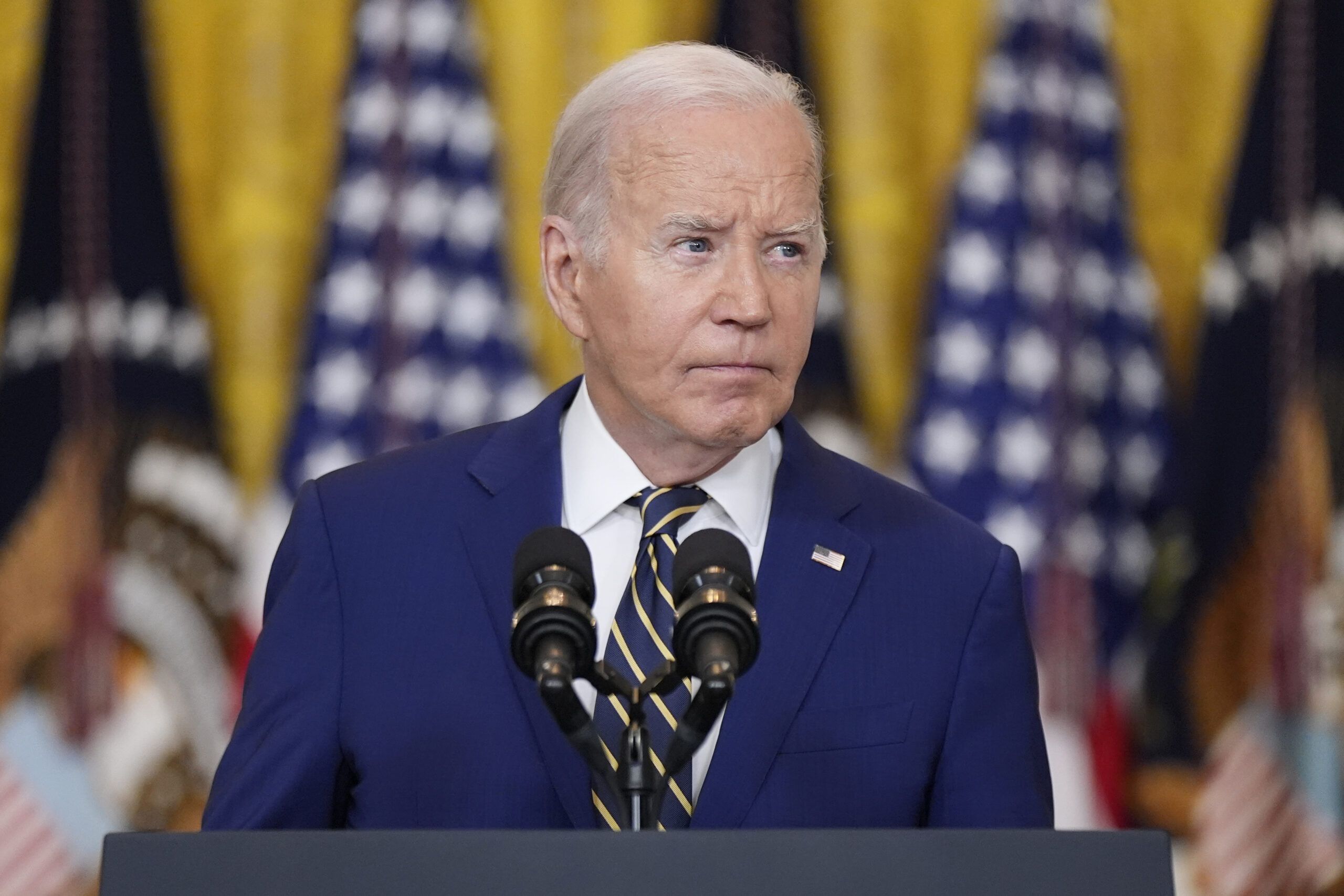

Democrats are hoping that former President Donald Trump’s polling lead in a series of swing states will alarm voters into supporting President Joe Biden after a sense of complacency was credited with dooming Hillary Clinton‘s presidential bid in 2016.
A lack of voter enthusiasm, particular by Democrats’ left flank, is attributed to Biden trailing in swing states from Michigan to Arizona. The polling gaps, combined with approval ratings seemingly stuck in the low 40s, has generated a sense of alarm among party insiders as Biden mounts another run for the White House.
But Democrats also see an upside to the state of the race. Unlike in 2016, when Clinton led Trump in virtually every poll of the presidential race, voters are increasingly primed for the scenario that Trump wins a second term in office, and Democrats are hoping to leverage anxiety over the prospect into a vote by progressives on Election Day.
“A complacent Democratic base is not what we want. We want people worried, anxious, that the end of democracy could be here this November. That’s what we need,” South Carolina state Sen. Dick Harpootlian, a longtime Biden supporter, told the Washington Examiner. “We need folks engaged because they’re scared and scared that Trump will get reelected. He’s already said he wants to be a dictator.”
Early on, fears that Biden is a uniquely weak candidate fueled pockets of dissent from Democratic lawmakers and operatives entertaining the idea of a new face at the top of the ticket. Rep. Dean Phillips (D-MN) mounted an unsuccessful primary challenge that was nonetheless a political nuisance for Biden, while longtime strategist David Axelrod raised controversy for questioning if it would be “wise” for Biden to stay in the race given his polling numbers.
The headlines generated by the intraparty fighting led to doubts about whether there would be a rematch between Biden and Trump in 2024 — doubts that continue to persist within a segment of the voting population.
“This isn’t a massive number of people, but there’s still, when we’re doing our research and we’re having more in-depth conversations with people, there are still voters who are not totally convinced that Trump and Biden are going to actually run against each other,” Democratic strategist Stefan Hankin said. “No one’s been officially nominated and they’re like, ‘Yeah, I don’t know if it’s going to happen.’”
“This is relatively small number stuff, but we’ve heard it enough where it’s like, ‘No, I guess this is a little bit of a thing,’” he added.
But with the nominating conventions quickly approaching — Trump’s is in July and Biden’s is in August — Democrats are hoping the binary choice will prompt voters to set aside their doubts about Biden, who has faced persistent concern about his age plus his handling of issues ranging from the war in Gaza to the economy.
The first debate between the two men on Thursday will help solidify perceptions of a presidential rematch.
The remarkable catch-up Trump and his associated fundraising groups have played in the presidential race has only added to the prodding from Democrats. Trump and the Republican National Committee outraised Biden and the Democratic National Committee $141 million to $81 million last month, a disparity fueled by the former president’s conviction on what Republicans believe were politically motivated charges. The Republican fundraising numbers mean Trump now has an advantage in cash on hand, $116.5 million to $91.6 million.
“With next week’s presidential debate, Trump’s sentencing, and the Republican conventions shortly after, we expect their fundraising will only climb,” the DNC wrote in a fundraising email over the weekend. “No one person could donate the amount we came up short. The only chance we have is if lots and lots of Democrats who understand the importance of this moment step up to help us close the gap.”
The silver lining for Democrats is that Biden has time to make up his polling gap given election season does not pick up in earnest until the fall.
Biden’s poll numbers have improved since Trump’s conviction in his New York hush money trial last month, but Trump remains ahead of Biden nationally by an average of 2.2 percentage points in polling that includes third-party and independent candidates, 40.4% to 42.6%, according to RealClearPolitics. According to FiveThirtyEight, they are even closer, with Biden ahead by less than 1 percentage point, 40.6% to 41%.
Biden is similarly behind Trump in the battleground state of North Carolina, but he is within the margin of error in the so-called blue wall states of Michigan, Pennsylvania, and Wisconsin. Biden can win 270 electoral votes and the presidency, irrespective of whether he loses swing states including Arizona, Georgia, and Nevada, as long as he retains the blue wall.
When pressed on what Democrats would do if Trump extends his lead over Biden to be, on average, outside the margin of error in more battleground states, Sen. John Fetterman (D-PA) predicted the polls would “tighten,” citing how they were “wrong” during his campaign in 2022.
Sen. Tina Smith (D-MN) emphasized that “polls go up” and “down,” asserting that she cares more about “what people do, not what they tell pollsters they’re going to do.”
“Over and over and over again, voters, when they show up to vote, are voting for Democrats,” Smith told the Washington Examiner. “We have a lot of work to do in order to make sure that we engage our voters and turn them out. But at the end of the day, I think that’s why we’ll win.”
Her colleague in the House, retiring Rep. Dan Kildee (D-MI), argued Democrats have a political edge because of wedge issues including abortion access. At the same time, Kildee said he is “not trying to minimize the challenge” for Biden and his party this election.
“The way I looked at it and looked at some of the internals in these polls, the undecided voters are people we can get,” Kildee told the Washington Examiner. “I feel OK about that. I also think campaigns matter. And we need a really robust campaign that leans in on the fundamental differences that will move voters.”
For Rep. Ro Khanna (D-CA), a more liberal Democrat who has tried to be a bridge between Biden and progressives angry at the president over the Israel-Hamas war, the election “really starts post-Labor Day.”
“[1988 Democratic presidential nominee Michael] Dukakis was 17 points up and then after Labor Day lost,” Khanna told the Washington Examiner. “If you’re president of the United States, you’re used to dealing with pressure. [Biden’s] had those big moments in his life and he’s always done really well with [them].”
No matter how Biden performs during the debate on Tuesday, Marist Institute for Public Opinion Director Lee Miringoff cautioned the Washington Examiner against assuming either candidate will see large shifts in polling in the presidential battlegrounds.
CLICK HERE TO READ MORE FROM THE WASHINGTON EXAMINER
“The numbers are tight, and there’s no reason to either decide to pop the champagne or to hold their head down,” Miringoff said. “I don’t expect big swings because I think a lot of the base votes are baked in for both candidates. There’s still a substantial number of people who are going to decide not only who they’re going to vote for, but whether they’re going to show up, and are they going to skip the line for president, if they do show up, or vote for Biden.”
“One of the big question marks for this election cycle, for the polls, is Biden is doing better with the high-propensity voters and Trump is doing better than he normally would with the low-propensity voters,” he continued. “If you had a choice, you would take the folks who are the older voters. Trump has made inroads with younger voters and non-white voters, but that’s the group that turnout is lower. So if you had a choice, and all things were equal, and whether the models are picking up on this or not, I would think that Biden has a slight advantage given the projected turnout.”
Marisa Schultz and Mabinty Quarshie contributed to this report.







